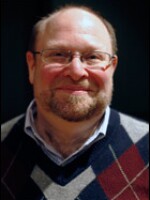RACHEL MARTIN, HOST:
Theaters across the world have closed because of the coronavirus pandemic. So they are scrambling to find ways to get work to the public. Some have made archival video of productions available. Some have created Zoom plays. And some, as Jeff Lunden reports, have returned to an old art form - radio drama, updated for the digital age.
JEFF LUNDEN, BYLINE: In the 1930s, with many people out of work, families huddled around radio receivers to listen to audio plays, like Orson Welles' famous broadcast, "War Of The Worlds."
(SOUNDBITE OF ARCHIVED RECORDING)
ORSON WELLES: Ladies and gentlemen, we interrupt our program of dance music to bring you a special bulletin from the Intercontinental Radio News. At 20 minutes before 8, Central Time, Professor Farrell of the Mount Jennings Observatory, Chicago, Ill., reports observing several explosions of incandescent gas occurring at regular intervals on the planet Mars.
ADAM GREENFIELD: Orson Welles began his career as a theater actor and director. And I think he's able to really utilize the full potential of what audio can do.
LUNDEN: Adam Greenfield is artistic director for New York's Playwrights Horizons. And he commissioned a new series of audio plays for a podcast called "Soundstage."
(SOUNDBITE OF MUSIC)
LUNDEN: He planned to release them this summer when the theater was dark. But because of the pandemic, he hustled them online.
(SOUNDBITE OF PLAY, "PRIME: A PRACTICAL BREVIARY")
HEATHER CHRISTIAN: (Singing) I wake up in the morning with this angel on my tongue.
LUNDEN: The first podcast released was "PRIME: A Practical Breviary" by songwriter and performer Heather Christian. It's based on the 6 a.m. rite - or breviary - of solo contemplation for nuns and monks.
CHRISTIAN: They live their entire lives devoted to contemplation on certain mysteries of existence or questions of how to be.
LUNDEN: And even though she recorded the piece in January, 2019, it seems to speak to our current moment.
CHRISTIAN: I felt, in the world, there's this void. And I feel like we are all bombarded with information, but none of it feels right anymore. Like, a fact doesn't carry weight anymore. And this has driven me nuts.
LUNDEN: While Mandy Greenfield - no relation to Adam - was sheltering in place, she listened to podcasts.
MANDY GREENFIELD: I was escaping into something that took me far away, felt human, felt immediate, but also engaged my imagination. I mean, that's the beauty of audio. And I think that that's the synergy with theater.
LUNDEN: Greenfield runs the Williamstown Theatre Festival. With this summer's season canceled, she had the idea of taking the seven plays that had been scheduled and turning them into audio dramas. So she's in the process of working with Audible to do just that.
ALAN AYCKBOURN: The theaters are trying to reinvent themselves, really...
LUNDEN: Acclaimed British playwright Sir Alan Ayckbourn.
AYCKBOURN: ...And are attempting to raise their voices and say, we are still here. We are still here. We can give you something. The one thing they can't give you is live theater.
LUNDEN: Ayckbourn got his start as a radio producer and does the sound design for all his stage works. So when his theater, the Stephen Joseph Theatre in Scarborough, shut down, he took an unproduced play, "Anno Domino," and made it into an audio drama, which is now available online.
AYCKBOURN: We're living in a very fortunate time, in one sense, in that we are able to communicate, albeit rather creakily at the moment. If anyone's ever done anything on Zoom, I recommend not - where people gurn at you, and they go out of sync. And you're looking like a bad Swedish movie.
LUNDEN: The 81-year-old playwright and his wife, actress Heather Stoney, recorded the play themselves in their home studio. It has eight different roles, from teens to octogenarians. And Ayckbourn and Stoney play all of the parts.
(SOUNDBITE OF PLAY, "ANNO DOMINO")
HEATHER STONEY: (As Ella) Now, I wanted to have a word with you, Martha, about Saturday, about what was said on Saturday. Sam and Milly's chattering and nonsense...
(As Martha) Yes, I wanted to say something about that, too, mommy. You see...
(As Ella) Now, please, don't interrupt, Martha. Allow me to finish. Don't interrupt your mother.
(As Martha) Sorry.
Thanks to the brilliance of Alan's editing, it managed to make a kind of sense. But I did find it very tricky because, obviously, you record one character - the voice, the lines. And then you record the other character. So it's quite difficult to be at the same level of fury or happiness at the same time.
LUNDEN: Stoney and Ayckbourn, as well as the other writers and producers, don't see audio theater as a long-term solution. And all of them are waiting for the time when their theaters are no longer closed.
AYCKBOURN: That has left a very big hole in my life. I can't wait to run into a room with my new toy under my arm - e.g., my play - and share it with a few people. So it's a curious time. And it will get curiouser.
LUNDEN: For NPR News, I'm Jeff Lunden in New York. Transcript provided by NPR, Copyright NPR.



